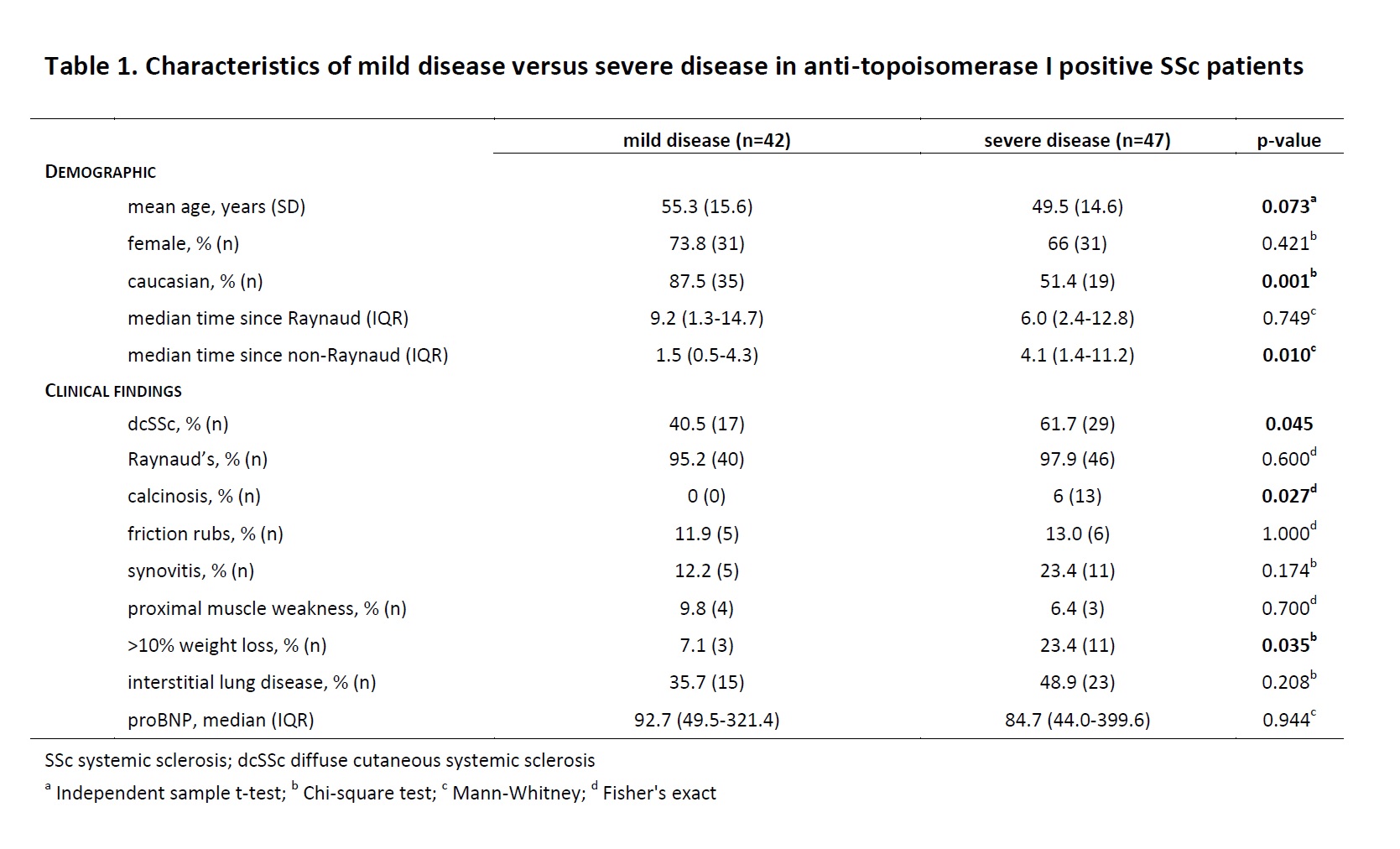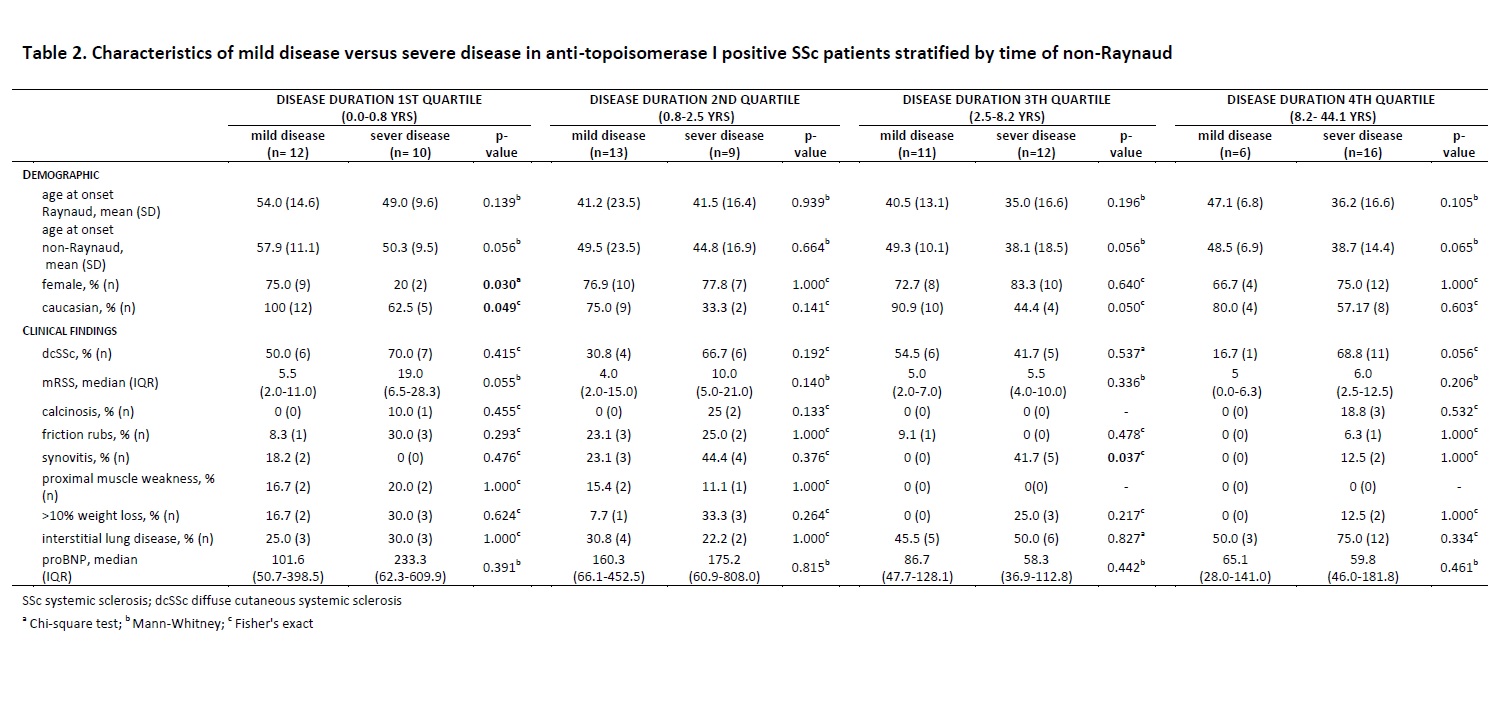Session Information
Session Type: ACR Poster Session B
Session Time: 9:00AM-11:00AM
Background/Purpose: Anti-topoisomerase antibodies (ATA) in systemic sclerosis have been associated with poorer prognosis including diffuse skin involvement, pulmonary fibrosis, cardiac involvement and increased mortality. However, 30-60% of ATA-positive SSc patients demonstrate only limited skin involvement and some have only mild disease course. In SSc, optimal risk stratification is of utmost importance for tailored clinical management at the patient level. Therefore, we aimed to determine the prevalence of mild disease among ATA positive patients and to investigate which readily available clinical parameters best identify patients with highest disease severity.
Methods: Data from baseline visits of all subjects in the Leiden Systemic Sclerosis cohort were extracted. Patients fulfilling ACR 2013 criteria and ATA positive were included. Descriptive statistics were used to summarize sociodemographic, clinical and serological features. Patients with grade 3 or 4 disease on general, peripheral vascular, skin, lung or kidney Medsger severity scale were considered to be severely diseased. We compared presence of diffuse cutaneous involvement, Raynaud’s, pitting scars, calcinosis, proximal muscle weakness, >10% weight loss, interstitial lung disease and pro-BNP between the severity groups and corrected for confounding by disease duration (time since non-Raynaud) by stratifying into quartiles.
Results: Of 422 SSc patients in the database, 344 patients had SSc meeting ACR criteria. 89 patients were exclusively ATA-positive, of which n=42 with mild disease and n=47 with severe disease. Patients with severe disease appeared to be younger, more often non-caucasian, with a longer time-since non-Raynaud and more often had diffuse skin involvement (dcSSc), calcinosis and weight loss (Table 1). Stratification by disease duration, however, showed that age and skin involvement were similar between patients with mild and severe disease. Only age at onset of first non-Raynaud, percentage of non-caucasians and percentage of patients with >10% weight loss was consistently different for patients with severe disease (Table 2).
Conclusion: In our cohort, 47% of ATA-positive patients presented with mild systemic sclerosis, which could not be explained by disease duration. This suggests that solely the presence of ATA is of limited clinical relevance. Readily available sociodemographic and clinical parameters including type of skin involvement seem to have only limited value in identifying ATA patients with more severe SSc. More complex serological findings as antibody titers and fine-specifity of ATA should be defined for optimal serological subsetting.
To cite this abstract in AMA style:
Boonstra M, Beerends GA, Scherer HU, Huizinga TWJ, de Vries-Bouwstra JK. Anti-Topoisomerase Positive Systemic Sclerosis – Prognosis Infaust? [abstract]. Arthritis Rheumatol. 2016; 68 (suppl 10). https://acrabstracts.org/abstract/anti-topoisomerase-positive-systemic-sclerosis-prognosis-infaust/. Accessed .« Back to 2016 ACR/ARHP Annual Meeting
ACR Meeting Abstracts - https://acrabstracts.org/abstract/anti-topoisomerase-positive-systemic-sclerosis-prognosis-infaust/


